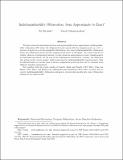Indistinguishability Obfuscation: From Approximate to Exact
Author(s)
Bitansky, Nir; Vaikuntanathan, Vinod
DownloadVaikuntanathan_Indistinguishability.pdf (420.8Kb)
OPEN_ACCESS_POLICY
Open Access Policy
Creative Commons Attribution-Noncommercial-Share Alike
Terms of use
Metadata
Show full item recordAbstract
We show general transformations from subexponentially-secure approximate indistinguishability obfuscation (IO) where the obfuscated circuit agrees with the original circuit on a 1/2+ϵ fraction of inputs on a certain samplable distribution, into exact indistinguishability obfuscation where the obfuscated circuit and the original circuit agree on all inputs. As a step towards our results, which is of independent interest, we also obtain an approximate-to-exact transformation for functional encryption. At the core of our techniques is a method for “fooling” the obfuscator into giving us the correct answer, while preserving the indistinguishability-based security. This is achieved based on various types of secure computation protocols that can be obtained from different standard assumptions.
Put together with the recent results of Canetti, Kalai and Paneth (TCC 2015), Pass and Shelat (TCC 2016), and Mahmoody, Mohammed and Nemathaji (TCC 2016), we show how to convert indistinguishability obfuscation schemes in various ideal models into exact obfuscation schemes in the plain model.
Date issued
2015-12Department
Massachusetts Institute of Technology. Computer Science and Artificial Intelligence Laboratory; Massachusetts Institute of Technology. Department of Electrical Engineering and Computer ScienceJournal
Theory of Cryptography
Publisher
Springer-Verlag
Citation
Bitansky, Nir, and Vaikuntanathan, Vinod. “Indistinguishability Obfuscation: From Approximate to Exact.” Kushilevitz E. and Malkin T., editors.Theory of Cryptography. TCC 2016. Lecture Notes in Computer Science, 9562 (2016): 67–95 © 2016 International Association for Cryptologic Research
Version: Author's final manuscript
ISBN
978-3-662-49095-2
978-3-662-49096-9
ISSN
0302-9743
1611-3349